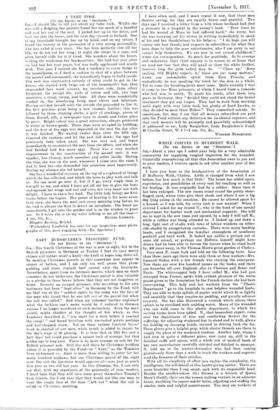LADY BURGHCLERE'S PRISONERS' FUND.
[To THE EDITOR or THE 131•ECISTOR:1 Ste,--The fourth Christmas of the war is now in sight, but to the British prisoners in Germany or Turkey I fear its once merry chimes will rather recall a knell—the knell of hopes long deferred. To mention Christmas parcels in this connexion may appear to savour of bathos. and I am only too well aware that plum- pudding and roast (tinned) beef cannot cure the heartache. Nevertheless, apart from its intrinsic merits, which men on short commons do not underrate, the Christmas parcel is also valuable as a pledge to these brave fellows that they are not forgotten at home. Recently an escaped prisoner, who according to his own teatiruony had been "kept alive" in Germany by the Fund, told me that one of the "saddest sights in the camp was the face of the man who found that he was left out of the parcel list when the roll was called." And when my informer further explained what the luckless one's menu would be if reduced to German rations I no longer wondered at sorb melancholy. Even the most ascetic might shudder at the thought of fish which, as this Londoner described it, "you smelt for a week before it reached the camp! " and bread bristling with unreeled potato peelings and half-chopped straw. Yet on these rations fourteen hours' work is enacted of our men, while insult is added to injury by the day's wage of 30 pfennig. It is true that in 1915 five and a half days' toil could purchase a square inch of sausage, but that golden age is long past. There is no more sausage on sale for the British prisoner now. Still less will there be Christmas pudding unless it is provided by the Fund—or " Aunt," as the Tommies have nicknamed its. Aunt is more than willing to cater for her many hundred nephews, but one Christmas parcel of the right sort—the sort the Spectator would approve of—costs just as much this year as two did last year. In this dilemma, Sir, I can only say that, with my experience of the generosity of your readers, I meet hope that they will once more prove themselves Tommy's kind friends, for I am sure that they would not like one man to went. the tragic face of the man " left out" when the roll is called on Christmas morning.
I have often said, and I must repeat it now, that these men deserve saving, for they are equally brave and grateful. Two days ago I received a letter from a wife whose husband had died a prisoner in a hospital in the enemy's land. "Ever since he had his wound at Mons lie had suffered hard," she wrote, but she was carrying out his wishes in writing immediately to speak of his and her thankfulness to his helpers. "I do hope you will convey our best thanks and respects to subscribers for what they have done to help the poor unfortunates, who I am sorry to say cannot help themselves. We are now in our second childhood," wrote one correspondent. So much for gratitude. As to courage and endurance, their chief anxiety is to assure us at home that we need not fear that they will quail or show the white feather, however long the grim ordeal may be. "'Cheer up," Keep smiling, Old Blighty expects it.' those are our camp mottoes," wrote one indomitable spirit from East Prussia, and undoubtedly he was speaking the truth for the men as a whole. Yet to some the breaking-point must come. Quito recently I fear it came to two Mons prisoners, of whom I heard from a comrade who had won to safety. To quote his words, after three long years in Germany, they " decided they could not stand the brutal treatment they got any longer. They bad to work from morning until night with very little food, but plenty of hard knocks, so they decided to meet their Maker." They committed suicide. In conclusion, Sir, may I say that all moneys subscribed are paid into the Fund without any deduction for incidental expenses, and that such moneys will be promptly and gratefully acknowledged if addressed to ate, Lndy Burghclere, Lady Burgliclere's Fund, 48 Charles Street, W. 1 P—I am, Sir, Re.,
WINIFRED BORORCERSZ.














































 Previous page
Previous page